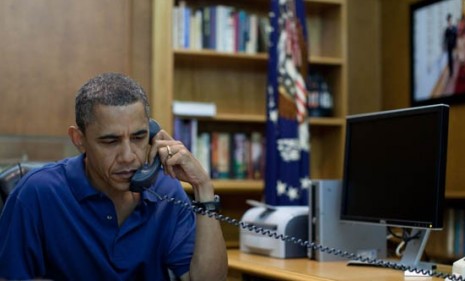America's deadliest day in Afghanistan: 4 lessons
Nearly two dozen members of America's Navy SEAL Team 6 are killed when their helicopter goes down. What does the devastating loss say about the war?

A free daily email with the biggest news stories of the day – and the best features from TheWeek.com
You are now subscribed
Your newsletter sign-up was successful
Thirty American servicemen, including 22 members of the elite Navy SEAL Team 6, were killed on Saturday, when their Chinook helicopter was apparently shot down in mountainous eastern Afghanistan. (Seven Afghan commandos and an interpreter were also killed.) It was the largest loss of American life in a single incident since the war began nearly 10 years ago. The SEAL-led team's mission: To aid a group of Army Rangers who'd become locked in a fierce firefight while chasing a Taliban leader suspected of orchestrating a string of bombings. What does this tragedy mean for the war effort? Here, four takes:
1. Our sacrifices have become too great
This tragedy only reinforces the argument that it's time to bring home all our men and women serving in Afghanistan, says Rick Rice at Wizbang. "There is no firm commitment from the top to win this thing," and fewer and fewer Americans want to stay there at all. If we don't have a strategy for victory — and it appears we don't — the loss of America's blood "is simply not worth it."
The Week
Escape your echo chamber. Get the facts behind the news, plus analysis from multiple perspectives.

Sign up for The Week's Free Newsletters
From our morning news briefing to a weekly Good News Newsletter, get the best of The Week delivered directly to your inbox.
From our morning news briefing to a weekly Good News Newsletter, get the best of The Week delivered directly to your inbox.
2. Our supposed allies may be suspect
SEAL Team 6 is "the same unit that nailed bin Laden," says Steven Hayward at Powerline. Because of the SEALs' secrecy, we'll never know whether the men who died Saturday were the same heroes who killed the al Qaeda leader, but "it seems doubtful this is a coincidence." The Pentagon shouldn't rest until it finds out "whether Bin Laden sympathizers in Pakistan's ISI, or inside the Afghan government, played some role in targeting and bringing down this crew."
3. Our presence in Afghanistan benefits the Taliban
The loss of life would perhaps be justifiable if the war was making America safer, or benefiting the Afghan people, says Medea Benjamin at The Huffington Post. But it's doing neither. The Taliban have "no interest in attacking anyone inside the United States." So when we wade into battles that kill Afghan civilians, or spend money propping up a corrupt government the people hate, we only strengthen Islamist insurgents. In fact, our presence in Afghanistan "gives the Taliban its raison d'etre."
A free daily email with the biggest news stories of the day – and the best features from TheWeek.com
4. Our job is nowhere near over
Remember, U.S. commandos conduct dozens of missions just like this one every week, says Kevin Sieff at The Washington Post. The only difference this time was "the disastrous ending." But to Afghans, the message in this tragedy is that "NATO-led forces have yet to reverse the Taliban's momentum," says Tom A. Peter in The Christian Science Monitor. The truth is, "the war will likely to drag on for a long time to come."
-
 James Van Der Beek obituary: fresh-faced Dawson’s Creek star
James Van Der Beek obituary: fresh-faced Dawson’s Creek starIn The Spotlight Van Der Beek fronted one of the most successful teen dramas of the 90s – but his Dawson fame proved a double-edged sword
-
 Is Andrew’s arrest the end for the monarchy?
Is Andrew’s arrest the end for the monarchy?Today's Big Question The King has distanced the Royal Family from his disgraced brother but a ‘fit of revolutionary disgust’ could still wipe them out
-
 Quiz of The Week: 14 – 20 February
Quiz of The Week: 14 – 20 FebruaryQuiz Have you been paying attention to The Week’s news?